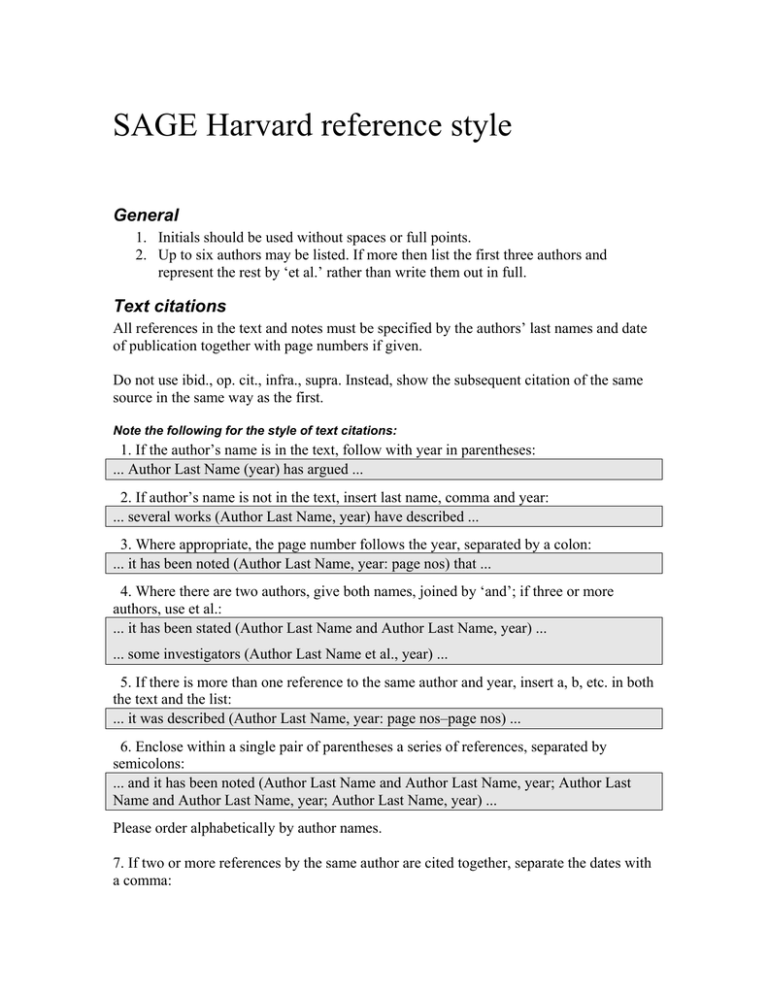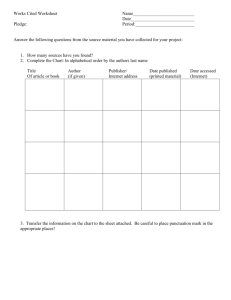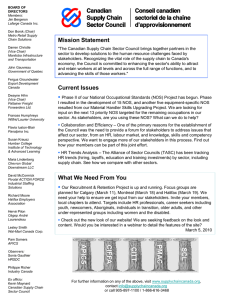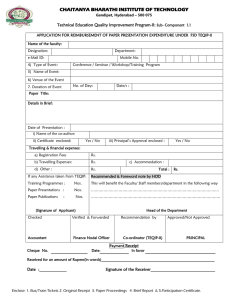SAGE Harvard Referencing Style Guide
advertisement

SAGE Harvard reference style General 1. Initials should be used without spaces or full points. 2. Up to six authors may be listed. If more then list the first three authors and represent the rest by ‘et al.’ rather than write them out in full. Text citations All references in the text and notes must be specified by the authors’ last names and date of publication together with page numbers if given. Do not use ibid., op. cit., infra., supra. Instead, show the subsequent citation of the same source in the same way as the first. Note the following for the style of text citations: 1. If the author’s name is in the text, follow with year in parentheses: ... Author Last Name (year) has argued ... 2. If author’s name is not in the text, insert last name, comma and year: ... several works (Author Last Name, year) have described ... 3. Where appropriate, the page number follows the year, separated by a colon: ... it has been noted (Author Last Name, year: page nos) that ... 4. Where there are two authors, give both names, joined by ‘and’; if three or more authors, use et al.: ... it has been stated (Author Last Name and Author Last Name, year) ... ... some investigators (Author Last Name et al., year) ... 5. If there is more than one reference to the same author and year, insert a, b, etc. in both the text and the list: ... it was described (Author Last Name, year: page nos–page nos) ... 6. Enclose within a single pair of parentheses a series of references, separated by semicolons: ... and it has been noted (Author Last Name and Author Last Name, year; Author Last Name and Author Last Name, year; Author Last Name, year) ... Please order alphabetically by author names. 7. If two or more references by the same author are cited together, separate the dates with a comma: ... the author has stated this in several studies (Author Last Name, year, year, year, year) ... Please start with the oldest publication. 8. Enclose within the parentheses any brief phrase associated with the reference: ... several investigators have claimed this (but see Author Last Name, year: page nos– page nos) 9. For an institutional authorship, supply the minimum citation from the beginning of the complete reference: ... a recent statement (Name of Institution, year: page nos) ... ... occupational data (Name of Bureau or Institution, year: page nos) reveal ... 10. For authorless articles or studies, use the name of the magazine, journal, newspaper or sponsoring organization, and not the title of the article: ... it was stated (Name of Journal, year) that ... 11. Citations from personal communications are not included in the reference list: ... has been hypothesized (Name of Person Cited, year, personal communication). Reference list General 1. Check that the list is in alphabetical order (treat Mc as Mac). 2. Names should be in upper and lower case. 3. Where several references have the same author(s), do not use ditto marks or em dashes; the name must be repeated each time. 4. Last Names containing de, van, von, De, Van, Von, de la, etc. should be listed under D and V respectively. List them as: De Roux, D.P. and not Roux, D.P., de. When cited in the main text without the first name, use capitals for De, Van, Von, De la, etc. (Van Dijk, year) 5. Names containing Jr or II should be listed as follows: • Author Last Name, Author First Name, Jr (year) • Author Last Name, Author First Name, II (year) 6. References where the first-named author is the same should be listed as follows: • Single-author references in date order; • Two-author references in alphabetical order according to the second author’s name; • Et al. references in alphabetical order; in the event of more than one entry having the same date, they should be placed in alphabetical order of second (or third) author, and a, b, etc. must be inserted. Brown J (2003) Brown TR and Yates P (2003) Brown W (2002) Brown W (2003a) Brown W (2003b) Brown W and Jones M (2003) Brown W and Peters P (2003) Brown W, Hughes J and Kent T (2003a) Brown W, Kent T and Lewis S (2003b) 7. Check that all periodical data are included – volume, issue and page numbers, publisher, place of publication, etc. Reference styles Book: Author A, Author B (year) Book title. Place: Publisher name. Clark JM, Hockey L (1979) Research for Nursing. Leeds: Dobson Publishers. Chapter in a book: Author A (year) Chapter title. In: Author A (ed.) Book title. Place: Publisher, 00–00. Author A (year) Chapter title. In: Author A, Author B (eds) Book title. Place: Publisher, 00–00. Gumley V (1988) Skin cancers. In: Tschudin V and Brown EB (eds.) Nursing the Patient with Cancer. London: Hall House, 26–52 Article in a journal: Author A, Author B, (year) Article title. Journal vol: 00–00. Author A, Author B, and Author C (year) Article title. Journal vol: 00–00. Author A, Author B, Author C, et al. (year) Article title. Journal vol: 00–00. Huth EJ, King K, and Lock S (1988) Uniform requirements for manuscripts submitted to biomedical journals. British Medical Journal 296: 401–405. Article in a journal published ahead of print: Author A, Author B, (year) Article title. Journal 00: 1–9 (accessed 00 month year). Author A, Author B, and Author C (year) Article title. Journal 00: 1–9 (accessed 00 month year). Author A, Author B, Author C, et al. (year) Article title. Journal 00: 1–9 (accessed 00 month year). Huth EJ, King K, and Lock S (1988) Uniform requirements for manuscripts submitted to biomedical journals. British Medical Journal 00: 1–4. Note: volume is given as “00”. Website National Center for Professional Certification. (2002) Factors Affecting Organizational Climate and Retention. Available at: www.cwla.org./programmes/triechmann/2002fbwfiles.


